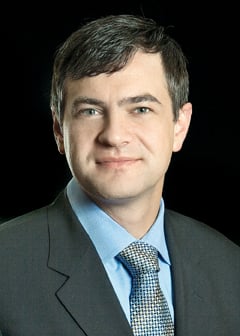[
Editor's note: Veteran brokerage recruiter and
InvestmentNews blogger Danny Sarch recently posted a story that generated a whole lot of reader comments. Given the title of Mr. Sarch's post,
“Why wirehouse advisers think independent brokers are a joke,” it's not overly surprising his story drew a little heat. Here's a response to Mr. Sarch's controversial blog post, written by Philip Palaveev, president of Fusion Advisor Network, a network of independent advisory firms.]
Independence does not need to be defended or explained. The advisers who have gone independent — and become business owners — know very well why they made that choice. Advisers and industry experts who need a statistical analysis to determine if independence is better or worse than employment in an institutional broker-dealer will likely never go independent. Quite frankly, they'll never understand why owning your own business is so compelling.
Hey, you don't get married after a careful examination of all the sizes and measures of your future spouse, and a complete comparison of her features to other potential mates. You just fall in love and know you have to do it. Independence is like that. It's a decision of passion as much as it is a rational business decision.
Advisers go independent because they are passionate about owning their own business and want to fully control how that business is run – how to service clients, what to charge, what clients to take, what managers to use, etc. There is no such thing as financial arbitrage between the systems.
Neither independence nor wirehouse employment is inherently more profitable. They represent different points on the risk-return continuum. Obviously, you take on more risk when you own your own business. One reason: You have to manage the expense of the operation. But you also have a chance to generate a higher profit.
Conversely, at a wirehouse, you can accept a pre-defined percentage of the revenue as income and have none of the expense risk.
Admittedly, it is interesting to compare numbers across the two setups. But such benchmarking won't alter the fundamental decision advisers must make: Which system fits their career goals the best?
Moreover, when statistics and numbers are used as proof that independent broker-dealers and their advisers or registered investment advisers are less professional, sophisticated or capable than wirehouse reps, well, I take issue with that. Average “rep production” numbers are completely irrelevant as a measure of quality of service or capabilities of an investment organization. They are also irrelevant as a measure of how significant independent broker-dealers and RIAs are in the investment industry, and their combined impact on consumers.
We don't measure how good a restaurant is by “revenue per server,” and we don't measure how good a dentist is by “teeth per hour.” Similarly, “production” is no measure for the quality of independent advisers or their broker-dealers.
In addition, we need to be careful when comparing "production" between a wirehouse rep and an independent-B-D adviser. Many items that are part of the "production" run of a wirehouse adviser have no equivalent in the independent space or are not paid out to the adviser. Somewhere around 20% of the “production” reported is not paid out to advisers in a wirehouse; the percentage is practically nil for independents. And independents do not deal with items such as rate sweeps, ticket charges, loan commissions, banking deposit fees, etc. Probably about 10% to 20% of the production of an adviser in a wirehouse has no equivalent in the independent world.
Reports from Cerulli Associates Inc. and Spectrem Group show that independent broker-dealers oversee around 15% of all assets under management. The market share for RIAs also works out to about 15%. While there is substantial overlap between the two groups, independent B-Ds and RIAs probably manage around 25% of the total assets in the industry. That works out to more than $2 trillion. Where I come from (and granted, it's a small place) $2 trillion is a pretty large number.
Look, the end of wirehouses is nowhere in sight. Demand for the services of large institutional brands isn't going to disappear anytime soon. And there are 50,000 talented advisers working in the big institutions who do a great job for their clients.
At the same time, there are another 100,000 or so talented individuals who have chosen to work for themselves and who are building their own firms and capabilities to service their own clients.
As my grandma used to say: "There are passengers for every train."







